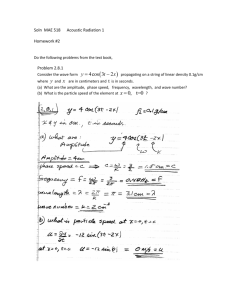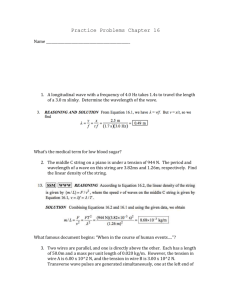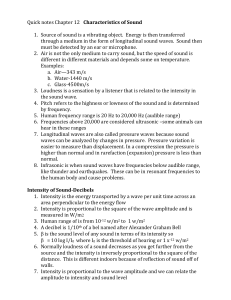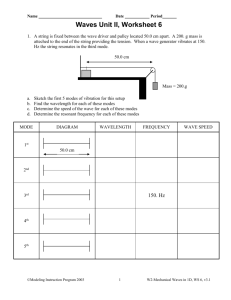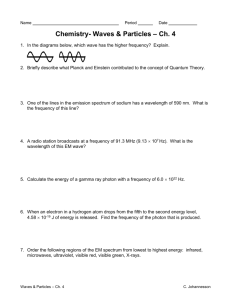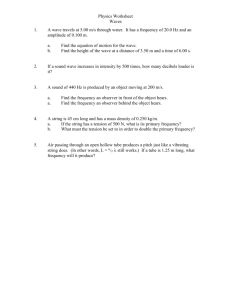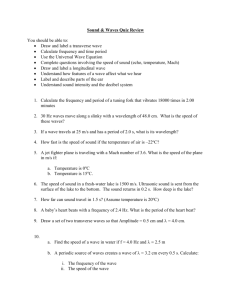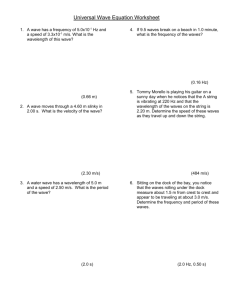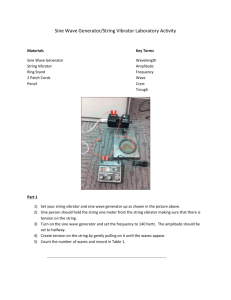1. When a sine wave is used to represent a sound wave, the crest
advertisement
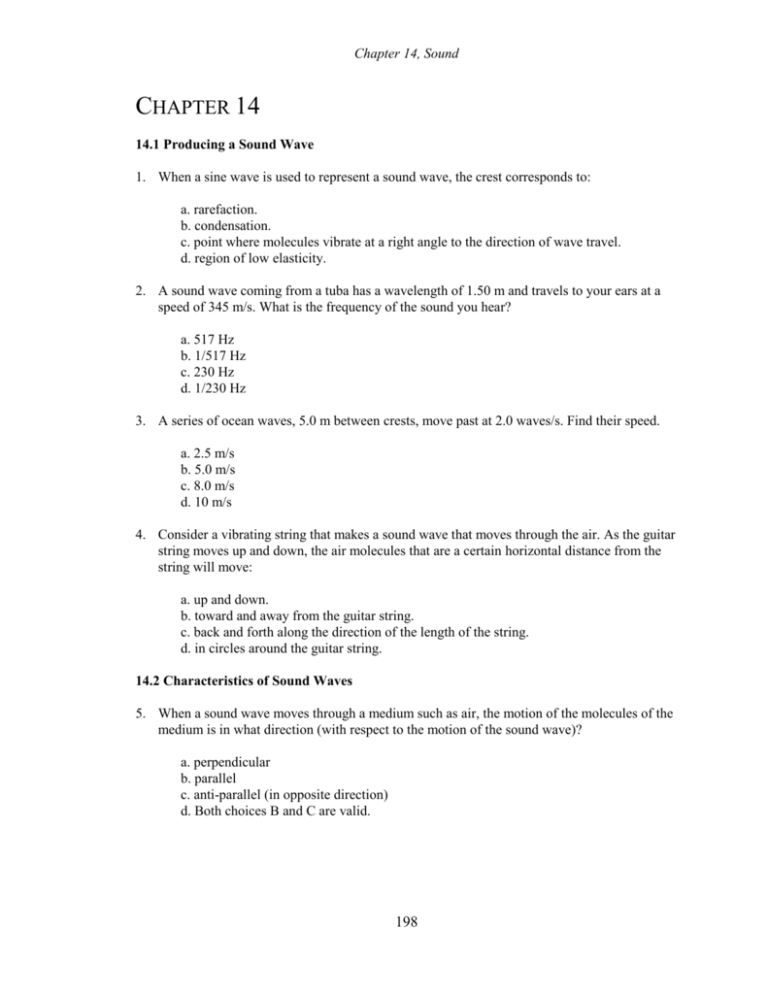
Chapter 14, Sound CHAPTER 14 14.1 Producing a Sound Wave 1. When a sine wave is used to represent a sound wave, the crest corresponds to: a. rarefaction. b. condensation. c. point where molecules vibrate at a right angle to the direction of wave travel. d. region of low elasticity. 2. A sound wave coming from a tuba has a wavelength of 1.50 m and travels to your ears at a speed of 345 m/s. What is the frequency of the sound you hear? a. 517 Hz b. 1/517 Hz c. 230 Hz d. 1/230 Hz 3. A series of ocean waves, 5.0 m between crests, move past at 2.0 waves/s. Find their speed. a. 2.5 m/s b. 5.0 m/s c. 8.0 m/s d. 10 m/s 4. Consider a vibrating string that makes a sound wave that moves through the air. As the guitar string moves up and down, the air molecules that are a certain horizontal distance from the string will move: a. up and down. b. toward and away from the guitar string. c. back and forth along the direction of the length of the string. d. in circles around the guitar string. 14.2 Characteristics of Sound Waves 5. When a sound wave moves through a medium such as air, the motion of the molecules of the medium is in what direction (with respect to the motion of the sound wave)? a. perpendicular b. parallel c. anti-parallel (in opposite direction) d. Both choices B and C are valid. 198 Chapter 14, Sound 6. Which of the following ranges corresponds to the longest wavelengths? a. infrasonic b. audible c. ultrasonic d. all have the same wavelengths 7. The frequency separating audible waves and ultrasonic waves is considered to be 20 kHz. What wavelength in air at room temperature is associated with this frequency? (Assume the speed of sound to be 340 m/s.) a. 1.7 cm b. 5.2 cm c. 34 cm d. 55 cm 8. Assuming that the wave speed varies little when sound waves are traveling though a material that suddenly changes density by 10%, what percentage of the incident wave intensity is reflected? a. < 1 % b. 5 % c. 10 % d. 20 % 14.3 The Speed of Sound 9. The speed of sound in air is a function of which one of the following? a. wavelength b. frequency c. temperature d. amplitude 10. The speed of sound at 0C is 331 m/s. What is the speed of sound at 25C? (0C = 273 K) a. 346 m/s b. 356 m/s c. 343 m/s d. 350 m/s 11. The density of a certain metal solid is 7.2 103 kg/m3, and its Young’s modulus is 10 1010 N/m2. What is the speed of sound in this metal? a. 1.4 107 m/s b. 5 900 m/s c. 3 700 m/s d. 3 000 m/s 199 Chapter 14, Sound 12. How far away is a lightning strike if you hear the thunderclap 3.00 s after you see the lightning bolt strike? (vsound = 340 m/s, vlight = 3 108 m/s) a. 113 m b. 340 m c. 680 m d. 1 020 m 13. A sound wave in air has a frequency of 500 Hz and a wavelength of 0.68 m. What is the air temperature? a. –18°C b. 0°C c. 15°C d. 27°C 14. Comparing the speed of sound in liquids, gases, and solids, the speed of sound is usually lowest in ________ and highest in ________. a. solids, liquids b. gases, liquids c. liquids, solids d. gases, solids 14.4 Energy and Intensity of Sound Waves 15. Tripling the power output from a speaker emitting a single frequency will result in what increase in loudness? a. 0.33 dB b. 3.0 dB c. 4.8 dB d. 9.0 dB 16. What is the intensity level of a sound with intensity of 5.0 1010 W/m2? (I0 = 1012 W/m2) a. 74 dB b. 54 dB c. 2.7 dB d. 27 dB 17. What is the intensity of a sound with a measured intensity level of 84 dB? (I0 = 1012 W/m2) a. 8.4 103 W/m2 b. 2.5 104 W/m2 c. 1.2 105 W/m2 d. 7.4 104 W/m2 200 Chapter 14, Sound 18. If one-third of the members of a symphony orchestra are absent because of head colds, thus reducing the overall intensity of sound by 33%, what will be the reduction in the decibel level? a. 30 dB b. 3 dB c. 48 dB d. 1.7 dB 19. If I0 = 1012 W/m2 is the threshold of hearing, a sound with intensity I1 = 1011 W/m2 will give a certain decibel level. Suppose a new sound has an intensity I2 = I12/I0. What is the new decibel level? a. 2.0 b. 20 c. 100 d. it will square the decibel level 20. If the intensity of a sound is increased by a factor of 100, how is the decibel level changed? The new decibel level will be: a. two units greater. b. double the old one. c. ten times greater. d. twenty units greater. 21. What is the intensity of sound from a band with a sound level of 120 dB? (I0 = 1012 W/m2) a. 1 W/m2 b. 1.2 W/m2 c. 10 W/m2 d. 12 W/m2 22. In the afternoon, the decibel level of a busy freeway is 80 dB with 100 cars passing a given point every minute. Late at night, the traffic flow is only 5 cars per minute. What is the late-night decibel level? a. 77 dB b. 74 dB c. 70 dB d. 68 dB 23. What sound level change corresponds to a factor of two change in intensity? a. 0.5 dB b. 2 dB c. 3 dB d. 5 dB 201 Chapter 14, Sound 14.5 Spherical and Plane Waves 24. Tripling the distance between sound source and a listener will change the intensity, as detected by the listener, by what factor? a. 1/9 b. 0.33 c. 3.0 d. 9.0 25. If the distance between a point sound source and a dB detector is increased by a factor of 4, what will be the reduction in intensity level? a. 16 dB b. 12 dB c. 4 dB d. 0.5 dB 26. The intensity level of sound 20 m from a jet airliner is 120 dB. At what distance from the airplane will the sound intensity level be a tolerable 100 dB? (Assume spherical spreading of sound.) a. 90 m b. 120 m c. 150 m d. 200 m 27. A very loud train whistle has an acoustic power output of 100 W. If the sound energy spreads out spherically, what is the intensity level in dB at a distance of 100 meters from the train? (I0 = 1012 W/m2) a. 78.3 dB b. 81.6 dB c. 89.0 dB d. 95.0 dB 28. By what amount does the sound intensity decrease when the distance to the source doubles? a. 1.4 dB b. 2.0 dB c. 4.0 dB d. 6.0 dB 202 Chapter 14, Sound 14.6 The Doppler Effect 29. A train station bell gives off a fundamental tone of 500 Hz as the train approaches the station at a speed of 20 m/s. If the speed of sound in air is 335 m/s, what will be the apparent frequency of the bell to an observer riding the train? a. 532 Hz b. 530 Hz c. 470 Hz d. 472 Hz 30. You stand by the railroad tracks as a train passes by. You hear a 1 000-Hz frequency when the train approaches, which changes to 800 Hz as it goes away. How fast is the train moving? The speed of sound in air is 340 m/s. a. 15.7 m/s b. 21.2 m/s c. 28.0 m/s d. 37.8 m/s 31. A sound source of frequency 1 000 Hz moves at 50.0 m/s toward a listener who is at rest. What is the apparent frequency heard by the listener? (speed of sound = 340 m/s) a. 853 Hz b. 872 Hz c. 1 150 Hz d. 1 170 Hz 32. A 500-Hz whistle is moved toward a listener at a speed of 10.0 m/s. At the same time, the listener moves at a speed of 20.0 m/s in a direction away from the whistle. What is the apparent frequency heard by the listener? (The speed of sound is 340 m/s.) a. 473 Hz b. 485 Hz c. 533 Hz d. 547 Hz 33. As a train starts from rest and then accelerates down the track, coming toward me faster and faster, the speed of the sound waves coming toward me will be: a. slower than the normal speed of sound in air. b. equal to the normal speed of sound in air. c. some constant speed faster than the normal speed of sound in air. d. faster and faster. 203 Chapter 14, Sound 34. An airplane flying with a constant speed flies from a warm air mass into a cold air mass. The Mach number will: a. increase. b. decrease. c. stay the same. d. become unstable. 35. While standing at a crosswalk, you hear a frequency of 560 Hz from an approaching police car. After the police car passes, its frequency is 480 Hz. What is the speed of the police car? (speed of sound = 340 m/s) a. 13.1 m/s b. 17.4 m/s c. 21.1 m/s d. 26.2 m/s 36. A bat, flying at 5.00 m/s toward a wall, emits a chirp at 50.0 kHz. If the wall reflects this sound pulse, what is the frequency of the echo received by the bat? (vsound = 340 m/s) a. 51.5 kHz b. 51.2 kHz c. 40.8 kHz d. 50.5 kHz 37. The Doppler shift of ultrasonic waves can measure the speed of blood in an artery. If the frequency of the stationary source is 100 kHz and the reflected sound has a Doppler shift of 200 Hz, what is the blood flow speed? (The speed of sound inside the body is 1 500 m/s.) a. 1.0 m/s b. 1.5 m/s c. 2.2 m/s d. 3.3 m/s 38. Two cars, one in front of the other, are traveling down the highway at 25 m/s. The car behind sounds its horn, which has a frequency of 500 Hz. What is the frequency heard by the driver of the lead car? (vsound = 340 m/s) a. 463 Hz b. 540 Hz c. 579 Hz d. 500 Hz 204 Chapter 14, Sound 39. A plane is traveling at Mach 0.950 through air at a temperature of 0C. What is the plane’s speed? (Speed of sound at 0ºC is 331 m/s.) a. 314 m/s b. 331 m/s c. 348 m/s d. Mach number is undefined at 0ºC. 14.7 Interference of Sound Waves 40. A phase difference of 270° corresponds to what wavelength difference? a. 3 b. 3/2 c. 3/4 d. 4/3 41. When two sound waves are out of phase by _______, destructive interference will occur. a. 90° b. 270° c. 540° d. 720° 42. Two loudspeakers are placed next to each other and driven by the same source at 500 Hz. A listener is positioned in front of the two speakers and on the line separating them, thus creating a constructive interference at the listener’s ear. What minimum distance would one of the speakers be moved back away from the listener to produce destructive interference at the listener's ear? (The speed of sound = 340 m/s.) a. 1.36 m b. 0.68 m c. 0.34 m d. 0.17 m 43. Two loudspeakers are placed side by side and driven by the same source at 500 Hz. A listener is positioned in front of the two speakers and on the line separating them, thus creating a constructive interference at the listener’s ear. If one of the speakers is gradually pushed toward the listener, how far must it be moved to repeat the condition of constructive interference at the listener's ear? (The speed of sound = 340 m/s.) a. 1.02 m b. 0.68 m c. 0.34 m d. 0.17 m 205 Chapter 14, Sound 44. When I stand halfway between two speakers, with one on my left and one on my right, a musical note from the speakers gives me constructive interference. How far to my left should I move to obtain destructive interference? a. one-fourth of a wavelength b. half a wavelength c. one wavelength d. one and a half wavelengths 14.8 Standing Waves 45. If the tension on a guitar string is increased by a factor of 3, the fundamental frequency at which it vibrates is changed by what factor? a. 9 b. 3 c. 3 d. 1/ 3 46. Doubling the tension in a guitar string will change its natural frequency by what factor? a. 0.71 b. 1.0 c. 1.4 d. 2.0 47. If I triple the mass per unit length of guitar string, its natural frequency changes by what factor? a. 0.58 b. 1.0 c. 1.7 d. 3.0 48. The lower A on a piano has a frequency of 27.5 Hz. If the tension in the 2.0-m-long string is 304 N and one-half wavelength occupies the string, what is the mass of the string? a. 100 g b. 25 g c. 37 g d. 50 g 49. If a guitar string has a fundamental frequency of 500 Hz, what is the frequency of its second overtone? a. 250 Hz b. 750 Hz c. 1 000 Hz d. 1 500 Hz 206 Chapter 14, Sound 50. A 100-m-long high-voltage cable is suspended between two towers. The mass of the 100-m cable is 150 kg. If the tension in the cable is 30 000 N, what is the lowest frequency at which this cable can oscillate? a. 0.71 Hz b. 1.0 Hz c. 1.4 Hz d. 2.0 Hz 51. A standing wave is set up in a 200-cm string fixed at both ends. The string vibrates in 5 distinct segments when driven by a 120-Hz source. What is the wavelength? a. 10 cm b. 20 cm c. 40 cm d. 80 cm 52. A 1.5-m string is held fixed at both ends. When driven by a 180-Hz source, the string vibrates in 4 distinct segments. What is the natural fundamental frequency of the string? a. 45 Hz b. 90 Hz c. 240 Hz d. 600 Hz 53. A standing wave is set up in a 2.0-m string fixed at both ends. The string vibrates in 5 distinct segments when driven by a 120-Hz source. In how many distinct standing wave segments will the string vibrate if the tension is increased by a factor of 4? a. 3 b. 10 c. 20 d. No standing wave pattern occurs. 54. For a standing wave on a string the wavelength must equal: a. the distance between adjacent nodes. b. the distance between adjacent antinodes. c. twice the distance between adjacent nodes. d. the distance between supports. 55. I stretch a rubber band and “plunk” it to make it vibrate in its fundamental frequency. I then stretch it to twice its length and make it vibrate in the fundamental frequency once again. The rubber band is made so that doubling its length doubles the tension and reduces the mass per unit length by a factor of 2. The new frequency will be related to the old by a factor of: a. 1.0. b. 1.4. c. 2.0. d. 4.0. 207 Chapter 14, Sound 56. A C note (f = 256 Hz) is sounded on a piano. If the length of the piano wire is 1.00 m and its mass density is 2.50 g/m, what is the tension in the wire? a. 84 N b. 168 N c. 655 N d. 1 280 N 14.9 Forced Vibrations and Resonance 57. A child sits on a swing supported by ropes of length 3.0 m. With what frequency will she need to apply the driving force to maintain swinging? a. 0.29 Hz b. 0.48 Hz c. 2.1 Hz d. 3.5 Hz 14.10 Standing Waves in Air Columns 58. A 2.50-m-long organ pipe is open at one end and closed at the other. Its fundamental tone has wavelength: a. 1.25 m. b. 5.00 m. c. 10.0 m. d. 16.25 m. 59. What is the lowest frequency that will resonate in an organ pipe 2.00 m in length, closed at one end? The speed of sound in air is 340 m/s. a. 42.5 Hz b. 85.0 Hz c. 170 Hz d. 680 Hz 60. When the standing wave pattern in a pipe is NANA, the pipe has which of the following set of properties? (N stands for node, A for antinode.) a. It is open at both ends. b. It is closed at both ends. c. It is open at one end and closed at the other end. d. Any of the above could be true. 208 Chapter 14, Sound 61. What is the first overtone frequency for an organ pipe 2.00 m in length, closed at one end? The speed of sound in air is 340 m/s. a. 42.5 Hz b. 85.0 Hz c. 128 Hz d. 680 Hz 62. A tuning fork is sounded above a resonating tube (one end closed), which resonates at a length of 0.200 m and again at 0.600 m. What is the frequency of the fork when the speed of sound is taken to be 340 m/s? a. 567 Hz b. 425 Hz c. 1 700 Hz d. 950 Hz 63. A tuning fork is sounded above a resonating tube (one end closed), which resonates at a length of 0.20 m and again at 0.60 m. If the tube length were extended further, at what point will the tuning fork again create a resonance condition? a. 0.8 m b. 1.0 m c. 1.2 m d. 1.6 m 64. For a standing wave in an air column in a pipe that is open at both ends, there must be at least: a. one node and one antinode. b. two nodes and one antinode. c. two antinodes and one node. d. two nodes and two antinodes. 65. If two adjacent frequencies of an organ pipe closed at one end are 550 Hz and 650 Hz, what is the length of the organ pipe? (vsound = 340 m/s) a. 0.85 m b. 1.25 m c. 1.50 m d. 1.70 m 66. A flute behaves like a tube open at both ends. If its length is 65.3 cm, and the speed of sound is 340 m/s, what is its fundamental frequency in Hz? a. 130 Hz b. 159 Hz c. 212 Hz d. 260 Hz 209 Chapter 14, Sound 67. The air in a tube open at both ends is sent into its fundamental resonance. One end of the tube is then closed and the air column is again set into its fundamental resonance. The resonant frequency _______________ after the end is closed. a. halves b. stays the same c. doubles d. increases by a factor of 1.4 14.11 Beats 68. What phenomenon is created by two tuning forks, side by side, emitting frequencies, which differ by only a small amount? a. resonance b. interference c. the Doppler effect d. beats 69. Two vibrating tuning forks, held side by side, will create a beat frequency of what value if the individual frequencies of the two forks are 342 Hz and 345 Hz, respectively? a. 687 Hz b. 343.5 Hz c. 339 Hz d. 3 Hz 70. A vibrating guitar string emits a tone simultaneously with one from a 500-Hz tuning fork. If a beat frequency of 5 Hz results, what is the frequency of vibration of the string? a. 2 500 Hz b. 505 Hz c. 495 Hz d. Either choice B or C is valid. 71. Two tuning forks sounding together result in a beat frequency of 3 Hz. If the frequency of one of the forks is 256 Hz, what is the frequency of the other? a. 262 Hz or 250 Hz b. 105 Hz c. 259 Hz or 253 Hz d. 85 Hz 210 Chapter 14, Sound 14.12 Quality of Sound 72. The number of overtones, and their relative intensities, is associated with what property of the tone generated by a musical instrument? a. quality b. interference pattern c. range d. attack pattern 73. The term “timbre” refers to which of the following? a. Any musical instrument made primarily of wood. b. The quality of sound from instruments due to the mixture of harmonics. c. Instruments that have valves. d. An instrument made in France. 14.13 The Ear 74. Of the frequencies listed below, to which one is the human ear most sensitive? a. 33 Hz b. 330 Hz c. 3 300 Hz d. 33 000 Hz 75. In which part of the ear is the cochlea? a. outer ear b. middle ear c. inner ear d. ear canal 211 Chapter 14, Sound CHAPTER 14 - ANSWERS # Ans Difficulty # Ans Difficulty 1. 2. 3. 4. 5. 6. 7. 8. 9. 10. 11. 12. 13. 14. 15. 16. 17. 18. 19. 20. 21. 22. 23. 24. 25. 26. 27. 28. 29. 30. 31. 32. 33. 34. 35. 36. 37. 38. B C D B D A A A C A C D C D C D B D B D A D C A B D C D B D D B B A D A B D 1 1 1 1 1 1 2 2 1 2 2 2 2 1 2 2 2 2 2 2 2 3 2 1 2 2 3 2 2 3 2 3 1 2 3 3 3 2 39. 40. 41. 42. 43. 44. 45. 46. 47. 48. 49. 50. 51. 52. 53. 54. 55. 56. 57. 58. 59. 60. 61. 62. 63. 64. 65. 66. 67. 68. 69. 70. 71. 72. 73. 74. 75. A C C C B A C C A D D A D A D C A C A C A C C B B C D D A D D D C A B C C 1 2 2 2 2 2 2 2 2 3 2 2 2 2 3 2 3 2 2 2 2 2 2 3 2 2 2 2 2 1 1 1 1 1 1 1 1 212
